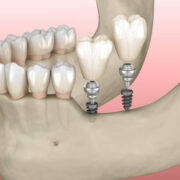Dental implants are a fantastic way to improve your smile, your confidence and your oral health. Implants are tiny metal posts that are placed directly into your jawbone. Once the bone has healed around them, they remain fixed in position and help support new replacement teeth. They’re an excellent solution for anyone who is struggling with broken or missing teeth. That said, not everyone is an ideal candidate for dental implants. Here’s what you need to know if you’re considering this procedure.
What are the benefits of dental implants?
They look natural and beautiful: When an implant is placed, a small titanium screw is inserted into your jawbone. After an appropriate healing time, a fabricated tooth or crown is attached to the implant. You’ll have a beautiful bright smile that looks completely natural.
Improved chewing and bite strength: Implants provide a fixed, secure tooth root. This improves chewing ability and reduces the likelihood of future tooth breakage.

Improved speech and breathing: When natural teeth are missing, surrounding muscles are affected, causing a change in the physical structure of the face. This can affect breathing, speech, and even chewing ability. Implants restore the natural function of the face and improve these symptoms.
Long-lasting: When cared for properly, dental screws are long-lasting. They have a success rate of over 95% after 10 years.
Affordable: Although dental implants are typically more expensive than other tooth replacement options, they’re a cost-effective solution when compared to dentures.
Who is a good candidate for dental screws?
They are a great option for anyone who is missing one or more teeth. There are, however, a few things to keep in mind when considering this procedure. Your dentist will evaluate your overall health, oral health, and the amount of bone in your jaw to determine if you are a good candidate for implants.
Good general health: Implants are minimally invasive procedures, but they are still surgeries, and as such, your general health plays a significant role in your ability to heal. If you have certain health conditions, your dentist may recommend delaying treatment until your overall health improves.

Good oral health: Your oral health plays a large role in your ability to heal after dental surgery. If you have gum disease, tooth decay, or other oral health issues, your dentist may recommend delaying treatment until you have addressed these issues.
A healthy amount of jawbone: Implants are a tooth replacement option, not an alternative to tooth removal. This means that you need enough healthy jawbone to support placement of the implant posts. If you have a very limited amount of jawbone, other tooth replacement options may be more appropriate.

Who is not a good candidate for implants?
The vast majority of people are good candidates for dental implants. Keep in mind that there are certain situations where implants are not recommended. If you have one or more of these conditions, you may not be an ideal candidate for implants:
You’re undergoing chemotherapy: Dental screws can be an excellent choice for tooth replacement after chemotherapy treatment. They are well suited for individuals whose bodies are struggling during this challenging time. In this case, however, you may need to wait until after chemotherapy to get your implants placed.
You are pregnant: Dental implants are safe for women who are pregnant. In some cases, however, you may need to wait until after the birth of your baby to get the implants placed.
You have uncontrolled diabetes: People with diabetes can benefit greatly from dental implants. People with diabetes, however, may have slower healing times, and their bodies may not respond as well to anesthesia. Your dentist will evaluate your specific situation and determine if you are a good candidate for implants.
How much do dental implants cost?
The price of dental implants varies significantly depending on your specific situation and the type of implants that are recommended.
Simple single tooth replacement: A single tooth implant can range from $800 to $1600. – Full upper or lower dental implants: Full upper or lower dental implants can cost $35,000 to $50,000.
Complex dental implants: Complex dental implants are more costly. If you are missing several teeth in one arch, your implants may cost $60,000 to $100,000.
All-on-four dental implants: An all-on-four dental implant procedure is likely to cost $10,000 to $15,000 per arch.
What should you know before implants?
You need to be patient: The healing time after dental implant surgery is typically at least three months. If you are in a rush to replace missing teeth, dental crowns or bridges are likely to be a better option.
You need good overall health: Dental implants require a significant amount of healing. If you have a chronic health condition, this healing time may be longer. In some cases, you may need to wait until your health has improved before undergoing dental implant surgery.
You need good oral health: Certain oral health issues, such as gum disease or tooth decay, can increase the healing time and may make dental implants less appropriate for your situation.
You need enough jawbone: Dental implants require healthy jawbone to support the implant posts. If you have a very limited amount of jawbone, other tooth replacement options may be more appropriate.
You can’t choose the type of implant: In most cases, the type of implant that is recommended is determined by your dentist and surgeon. You do have a say in the number of implants that are recommended, however.
Conclusion
Dental implants are an excellent way to replace missing teeth. They are a great option for anyone with gum disease or a lack of sufficient jawbone. They are also a great option for those who are pregnant or dealing with diabetes. If you are struggling with broken or missing teeth, dental implants are a great solution. They are a long-lasting, natural-looking tooth replacement option that can significantly improve your oral health and confidence. Dental implants are not a good choice, however, if you have a very limited amount of jawbone or if you are undergoing chemotherapy.
Follow Us For More Updates






there are so good royal dental clinic